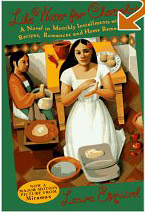summer reading

"Tita thought of the many times she had germinated kernels or seeds of rice, beans, or alfalfa, without giving any thought to how it felt for them to grow and change form so radically. Now she admired the way they opened their skin and allowed the water to penetrate them fully, until they were split asunder to make way for new life. She imagined the pride they felt as the tip of the first root emerged from inside of them, the humility with which they accepted the loss of their previous form, the bravery with which they showed the world their new leaves. Tita would love to be a simple seed, not to have to explain to anyone what was growing inside her, to show her fertile belly to the world without laying herself open to society's disapproval. Seeds didn't have that kind of problem, they didn't have a mother to be afraid of or a fear of those who would judge them."
(from page 198, Like Water for Chocolate by Laura Esquivel, translated by Carl and Thomas Christensen, Doubleday 1992).
Many years ago, I saw and loved the movie, which I'm sure most readers have seen too. On these hot lazy summer afternoons I've been reading some light fiction, including Like Water for Chocolate. Usually I like the book better than the movie, but not this time. I did enjoy reading the traditional Mexican recipes, but they were oddly popped into passages. The writing seems rather stiff, perhaps because it's written by a screenwriter, or is it the translation? As a lover of folk and fairy tales, I enjoyed the magical realism, as well as the love story and glimpses into Mexican culture at the time of the revolution. Frida Kahlo's paintings came to mind. The quoted passage above, for me, was one of the more inspired and intriguing ones, making me pause several times to savour the words and meaning.
Marja-Leena | 10/07/2006 | 7 comments
themes: Books

My light reading has been something somewhat different: Sara Paretsky's Fire Sale which is her latest about her female private detective V.I.Warshawski. I enjoyed that very much, and am now about to start Barbara Nadel's Dance with Death, set in Istanbul.
I have not read Like Water for Chocolate, and don't think I have seen the film either. I shall have a look when I pass the bookshop this morning.
I like South American novels (translated into Finnish or English, of course).
We have magical realism already in Kalevala (our national epic) - the road speaks, you can fly on giant birds etc.
I have seen some South American films directed by women at a film festival. It's a pity one can not see them anywhere else.
Omega, your books sound intriguing - will add them to my list of library searches!
Hei Anna! The Kalevala is a great example of magical realism, like many folk epics and tales. There are many interesting and well-done films shown at film festivals that never get exposed in the mainstream theatres and are often hard to find - indeed a pity. Even our own Canadian ones.
I tried to read the book in Spanish, but never got very far - so many words for food to look up! Perhaps I'll try again sometime when I have more motivation and patience. But it's also so sad, like many Mexican legends. I need to find some good summer reading...
I love the imagery and the rich story-telling history found in Mexican & South American novels. I really enjoyed "LIke Water for Chocolate" - both movie and book. I think it's the translation into English that makes it sound stilted. I am also a fan of Isabelle Allende. Esquivel's book made me hungry. Happy reading!
Marja-Leena, I just jumped over to you from a blog where the subjekt was how the daughter despises her mother, and I felt your quote soothing. In a way the Nature is forgiving . . .
I'm familiar with Sarah Paretsky, like her and buy her books for my Chicago-born husband. SP writes from Chicago background.
Leslee - I bet the original Spanish is much more beautiful than the English translation! Aren't many folk legends a mix of joy and sadness, just like life?
Jackie - that's interesting that you think the translation makes it stilted. The recipes almost all seem to call for a lot of hot peppers and are very labour intensive, not my kind of cooking! I like Isabelle Allende too.
Tuovi - that's serendipity! Paretsky is new to me, will have to look for her in the library!